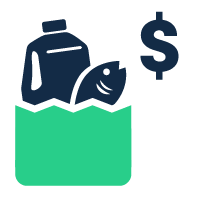How Rising Inflation Can Actually Benefit Borrowers

What Is Inflation And How Does It Affect Me?
Inflation is essentially the price increase of goods and services, whether it’s small, medium or big ticket items ranging from food and beverages to housing. The Department of Statistics of Singapore tracks the price increase or decrease every month and publishes it officially as the Consumer Price Index, or CPI every month.
Aside from the CPI, the core inflation measure is also something that MAS monitors closely. This core inflation measure is actually a variant of the regular inflation rate excluding accommodation costs and private transport costs, and it’s a better gauge of inflation rates as most of us own homes and take public transport often.
As a consumer, this price increase or decrease affects you directly in various ways including:
How Does Inflation Affect Interest Rates?
The relationship between inflation and interest rates is quite straightforward. Interest rates usually move according to the direction of inflation, as interest rates are among the key monetary policy tools used by many banks around the world to manage inflation.
So when rising inflation occurs, higher interest rates will be an expected policy response. On the other hand, when inflation decreases and economic growth slows down, lower interest rates may be introduced by banks to stimulate the economy.
Does Inflation Affect Personal Loans?
For those who have taken on personal loans with somewhat fixed low-interest rates, inflation wouldn’t really affect them much, because as the value of cash erodes, you’ll just be making the same payments monthly or annually.
When compared to taking out floating (variable) rate loans, rising inflation won’t cut into costs of paying back a personal loan as much. In fact, you’ll realise that your personal repayment costs will be relatively cheaper over time compared to floating (variable) rate loans.
Should I Take A Personal Loan When Inflation Is High?
Let’s say you take out a new personal loan during the season of rising inflation. You’re actually paying back the bank with money that is worth less than it was before the inflation period, because the value of cash is declining.
If you’ve already signed up for a personal loan with a bank before the inflation began, the inflation will benefit you even more as you technically have more money in your paycheck to pay off the debt while still owing the same amount of money. So be it for urgent medical expenses, more cash liquidity for your business or other reasons, getting a personal loan during inflation is one way to cope with specific situations that can either help you save some money in the long term or to pay off emergency bills in the short term.
However, we should also take into account your current income, financial commitments and other related factors when being tied down to monthly repayments for personal loans.
On the other hand, if you are confident of repaying your personal loan as soon as possible, a revolving personal loan would be apt despite higher interest rates. While you have a think about the pros and cons of these two types of personal loans, you may wish to read more about them in our blog article here.
Check out other Personal Loans with Low Interest Rates & Fast Approval
Frequently Asked Questions
Does inflation affect interest rates?
- Yes. Interest rates often rise during rising inflation conditions. On the other hand, when inflation decreases and economic growth slows down, lower interest rates tend to be offered by banks to stimulate the economy.
What is the core inflation measure?
- The core inflation measure is a variant of the regular inflation rate excluding accommodation costs and private transport costs, and MAS uses it to gauge inflation rates in Singapore.
Will inflation affect my personal loan?
- Inflation usually affects most loans, but if your personal loan comes with fixed low-interest rates, inflation wouldn’t really have much impact on your loan, because as the value of cash erodes, you’ll just be making the same payments monthly or annually.
Should I take a loan during a rising inflation period?
- Yes and no. This really depends on your financial capacity to pay back the personal loan, whether you’re going for a term personal loan which has a fixed period of time or a revolving personal loan, your credit score, and many other factors which you have to take into account.



